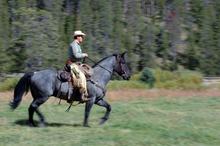Reports of rabid bats, skunks, and raccons are making headlines from the South to the North and from the East to the West. Rabid bats have been found in Alaska, Ohio, New Mexico, Nevada, Idaho and Washington. Raccoons with the disease have been reported in North Carolina and New York, and warnings about rabid skunks are being issued nation wide.

Protecting your horse from rabies
Usually, rabies doesn't appear until later in the year, but with unseasonably warm weather, wild animals are more active and are making their way into parks, horse trails, and backyards of homes..
Usually, rabies doesn't make its appearance until later in the year, but unseasonably warm weather in many areas means that wild animals are more active earlier in the year and are making their way into areas where people are enjoying the outdoors including parks, horse trails, and backyards of homes near wild life areas.
What does this mean for horse owners? According to AAEP, rabies is an infrequently encountered neurological disease of equines. While the incidence of rabies in horses is low, the disease is invariably fatal and has considerable public health significance. It is recommended that rabies vaccine be a core vaccine for all equids.
Exposure occurs through the bite of an infected (rabid) animal, typically a wildlife source such as raccoon, fox, skunk, or bat. Bites to horses occur most often on the muzzle, face, and lower limbs. The virus migrates via nerves to the brain where it initiates rapidly progressive, invariably fatal encephalitis.
Rabies vaccines for horses:
Three vaccines are licensed for rabies prophylaxis in horses. All are inactivated tissue culture derived products. The vaccines are given by intramuscular injection and appear to be safe. Rabies is an excellent immunogen and these vaccines induce a strong serologic response after a single dose.
Learn more about Rabies in Horses
